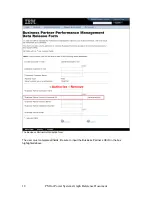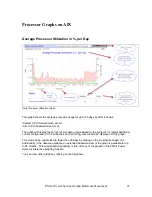
Guidelines for Total Processor Utilization
These are shown in the ‘FACTS’ at the bottom of most graph pages.
These are the processor utilization guidelines that are used to determine if a resource is ‘OK’,
‘marginal’, or ‘critical’. They are based on the number of processors that are configured for the
server/LPAR.
‘Average’ by definition indicates the average utilization for all hours in the shift for the measured
days in the period.
‘Peak’ average indicates an average of the two busiest hours during the shift for the measured
days in the period.
If a measurement exceeds the marginal percentage in the table, then the particular resource
being measured should be given attention in the near future.
If a measurement exceeds the critical percentage, then immediate attention should be given to
the system resource being measured.
22
PM for Power Systems Graph Reference Document
















































